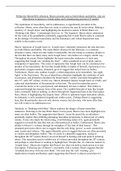Within the Skirrid Hill collection, Sheers presents men as both failures and bullies, who are
often shown to possess a violent nature and a domineering persona [25 marks]
The exploration of masculinity, and its ruthlessness, is significantly prevalent in the
collection. Sheers, more often than not, seeks to criticise the men he writes about. Making a
mockery of ‘Joseph Jones’ and highlighting the destructive nature of Hitler Hunzvi in
‘Drinking with Hitler’. Contrastingly however, in ‘The Equation’ Sheers shows admiration
for the work of his grandfather, potentially suggesting that overall Sheers seeks to comment
on the damage of modern masculinity and the dominance and violent dispositions men
exhibit in the modern world.
Sheers’ depiction of Joseph Jones in, ‘Joseph Jones’ ultimately epitomises the idea that men
are both failures and bullies. The name Sheers chooses for the character, is a common,
alliterative name, which not only makes it memorable, but also being so common, alludes to
the fact that there are likely many more Joseph Jones’ who behave in a largely similar way.
Throughout the poem, Sheers highlights the hyper-masculine tendencies of such men,
suggesting that Joseph was ‘stroking his chest’ – often considered an act of pride, and an
assumption of superiority. This sense of superiority that Joseph feels can be considered a by-
product of his masculinity; the fact that Joseph thinks so highly of himself, expressing so in a
particularly arrogant manner, ultimately gives to suggest that indeed men are bullies.
Furthermore, Sheers also outlines Joseph’s violent disposition as he remembers ‘late night
fights’ in the final stanza. The use of plural here ultimately highlights the continuity of such
occurrences, and altogether elucidates the brutal macho ‘culture’ prevalent throughout the
late 19th, early 20th century. In this way, Sheers ultimately depicts Joseph Jones as a bully, and
a physical manifestation of the patriarchy at this time. The need for masculine power
overrode the desire to be a good person, and ultimately led men to failure. This failure is
expressed through the stanzaic form of the poem. The youthful bravado of men like Joseph
Jones eventually fades to nothing, as shown through the fragmented lines in the final stanza.
Here, Sheers is highlighting that despite Jones’ efforts to epitomise hyper masculine culture,
he ultimately is still considered insignificant within society. Perhaps Sheers is suggesting
here, that the patriarchy does not only destroy women, but also men, who more often than
not, fall victim to its ruthlessness too.
Similarly, in ‘Drinking with Hitler’ Sheers explores the danger of hyper-masculine
tendencies. Referring to the late Hitler Hunzvi in his poem, Sheers once more highlights how
many are often bullies. The suggestion that Hunzvi ‘wears his poem like an aftershave’
potentially implies that exhibiting damaging masculine propensities is almost part of a daily
routine. It may also imply the intoxicating, overwhelming nature of it, again potentially
suggestive towards the idea that men are often portrayed as bullies. Furthermore, Sheers also
alludes to Hunsvi’s violence through his metaphor of ‘the fruit of their bruises’. This
unnatural perversion allows one to suggest that the only thing ‘grown’ as such, around this
man, is pain and violence. This again ultimately gives to suggest that men are often presented
as violent, and altogether, bullies. This of course is a plausible suggestion, seeing as
throughout the 20th century Hunzvi involved himself in beatings and took pride in torturing
others. This masculine need to exhibit acts of violence prevailed throughout the 20th century,
and perhaps is what Sheers is seeking to highlight here. Despite this, in a likewise manner to
‘Joseph Jones’, Sheers also implies that Hunzvi too, does not hold as much power as it may
first appear. Following one of Hunzvi’s encounters with a woman, Sheers suggests that she
‘[washed] him away with one slow blink’. Not only does the verb ‘washing’ give
implications towards purification, again suggesting that Hunzvi is almost somewhat of a





